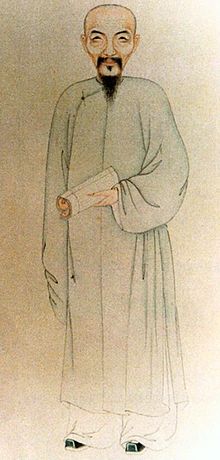This article needs additional citations for verification. (May 2011) |
Ji Xiaolan 紀曉嵐 | |||||||
|---|---|---|---|---|---|---|---|
 | |||||||
| Assistant Grand Secretary | |||||||
| In office 1805–1805 | |||||||
| Minister of Rites | |||||||
| In office 9 October 1797 – 15 March 1805 Serving with Deming (until 1800), Dachun (1800–1802), Changlin (1802), Yongqing (1802–1803), Nayancheng (1803–1804), Linning (1804), Gūnggala (since 1804) | |||||||
| Preceded by | Jin Shisong | ||||||
| Succeeded by | Liu Quanzhi | ||||||
| In office 22 September 1792 – 5 July 1796 Serving with Changqing (until 1793), Deming (since 1793) | |||||||
| Preceded by | Liu Yong | ||||||
| Succeeded by | Jin Shisong | ||||||
| In office 7 March 1787 – 3 March 1791 Serving with Debao (until 1789), Changqing (since 1789) | |||||||
| Preceded by | Peng Yuanrui | ||||||
| Succeeded by | Liu Yong | ||||||
| Minister of War | |||||||
| In office 5 July 1796 – 13 November 1796 Serving with Qinggui | |||||||
| Preceded by | Zhu Gui | ||||||
| Succeeded by | Shen Chu | ||||||
| Personal details | |||||||
| Born | 26 July 1724 Xian County, Zhili, Qing China | ||||||
| Died | 14 March 1805 (aged 80) Beijing, Qing China | ||||||
| Spouse | Lady Ma (died 1795) | ||||||
| Children | Ji Ruji (born 1743) Ji Ruxi (born 1766) Ji Ruyi (born 1784) | ||||||
| Parent | Ji Rongsu (father) | ||||||
| Education | jinshi degree | ||||||
| Posthumous name | Wenda 文達 | ||||||
| Chinese name | |||||||
| Traditional Chinese | 紀昀 | ||||||
| Simplified Chinese | 纪昀 | ||||||
| |||||||
| Xiaolan | |||||||
| Traditional Chinese | 曉嵐 | ||||||
| Simplified Chinese | 晓岚 | ||||||
| |||||||
| Chunfan | |||||||
| Chinese | 春帆 | ||||||
| |||||||
| Shiyun | |||||||
| Traditional Chinese | 石雲 | ||||||
| Simplified Chinese | 石云 | ||||||
| |||||||
| Guanyi Daoren | |||||||
| Traditional Chinese | 觀弈道人 | ||||||
| Simplified Chinese | 观弈道人 | ||||||
| |||||||
Ji Yun (simplified Chinese: 纪昀; traditional Chinese: 紀昀; pinyin: Jǐ Yún;[1] 1724–1805), also known as Ji Xiaolan (simplified Chinese: 纪晓岚; traditional Chinese: 紀曉嵐; pinyin: Jǐ Xiǎolán) or Ji Chunfan (Chinese: 紀春帆; pinyin: Jǐ Chūnfān) was a Chinese philosopher, politician, and writer. He was an influential scholar of Qing dynasty China and many anecdotes have been recorded about him. Ji Yun left behind a book entitled Notes of the Thatched Abode of Close Observations (閱微草堂筆記)[2] and another book named Wenda Gong Yiji (紀文達公遺集; "Collected Works of Lord Wenda", i.e. Ji Xiaolan), which was edited by later generations. He was often mentioned with Yuan Mei as the "Nan Yuan Bei Ji" (Chinese: 南袁北紀; lit. 'Yuan of the south and Ji of the north').[3]
- ^ According to the Wang Li Character Dictionary of Ancient Chinese the character 紀 is given the Middle Chinese fanqie pronunciation 居里切, resulting in an expected Mandarin reading of jǐ. However, the character, when used to mean 'records; annals' has been read as jì (Mandarin Tone 4) since the 20th century, with jǐ (Mandarin Tone 3) given as an obsolete literary reading. As a surname, the old reading Jǐ continues to be used.
- ^ Sun, Haichen 孙海晨, ed. (1998). Fantastic Tales By Ji Xiaolan / 纪晓岚志怪故事选 (in English and Chinese). Translated by Sun, Haichen 孙海晨. Beijing: New World Press. ISBN 7-80005-357-1.
- ^ 26岁官至正处级,33岁辞职做网红,这个清朝吃货不简单. APD News (in Chinese). 2017-09-26. Retrieved 2018-11-23.